TRAVEL
Georgia on my mind — wolf cults, wine, Russians and war
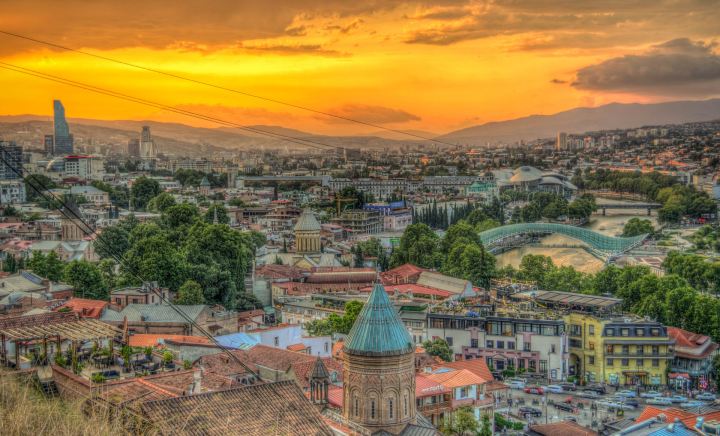
I’m led to a ramshackle table with several paper-cup towers and two long, unlabelled bottles of clear liquid. One hour later, in fluent Georgian, I explained not only the general secrets of the universe to my new friends, but for the first time since I could remember, I knew exactly what to do with my life.
‘No, no, no, nooo,” Lolo utters, gesticulating wildly. “You can’t do that here.”
He could only be referring to my shouting “Salami” to passers-by in the cobbled alleyway we were inhabiting, I thought. I had just discovered the term for “Hi there” in his language, and I couldn’t get enough of it: “Salami, salami, hi there, salami to you.”
It contained none of the insipid lameness of a “Hello” or throwaway familiarity of a “Hi”. It sounded more exotic, more… well, Italian.
Until I heard some of the rest.
Rogor brdzandebit?
(How are you?)
Gmandiobt k’argadi!
(I’m good, thank you!)
I was hooked. Anyone who can speak fluent Dr Seuss, I mused, would be a friend of mine. And a grinning Lolo, holding forth at his kerbside court, was becoming a contender.
I had met Lolo and his cohorts, Mikheili the builder, and Levan, a transport driver like Lolo, perched on a low wall outside one of the countless small all-purpose convenience stores dotted around Tbilisi, the capital city of Georgia (no, the other one, north of Turkey, Armenia and Azerbaijan).

Rike Park, Tbilisi, Georgia. Image: Kent Tupas for Unsplash
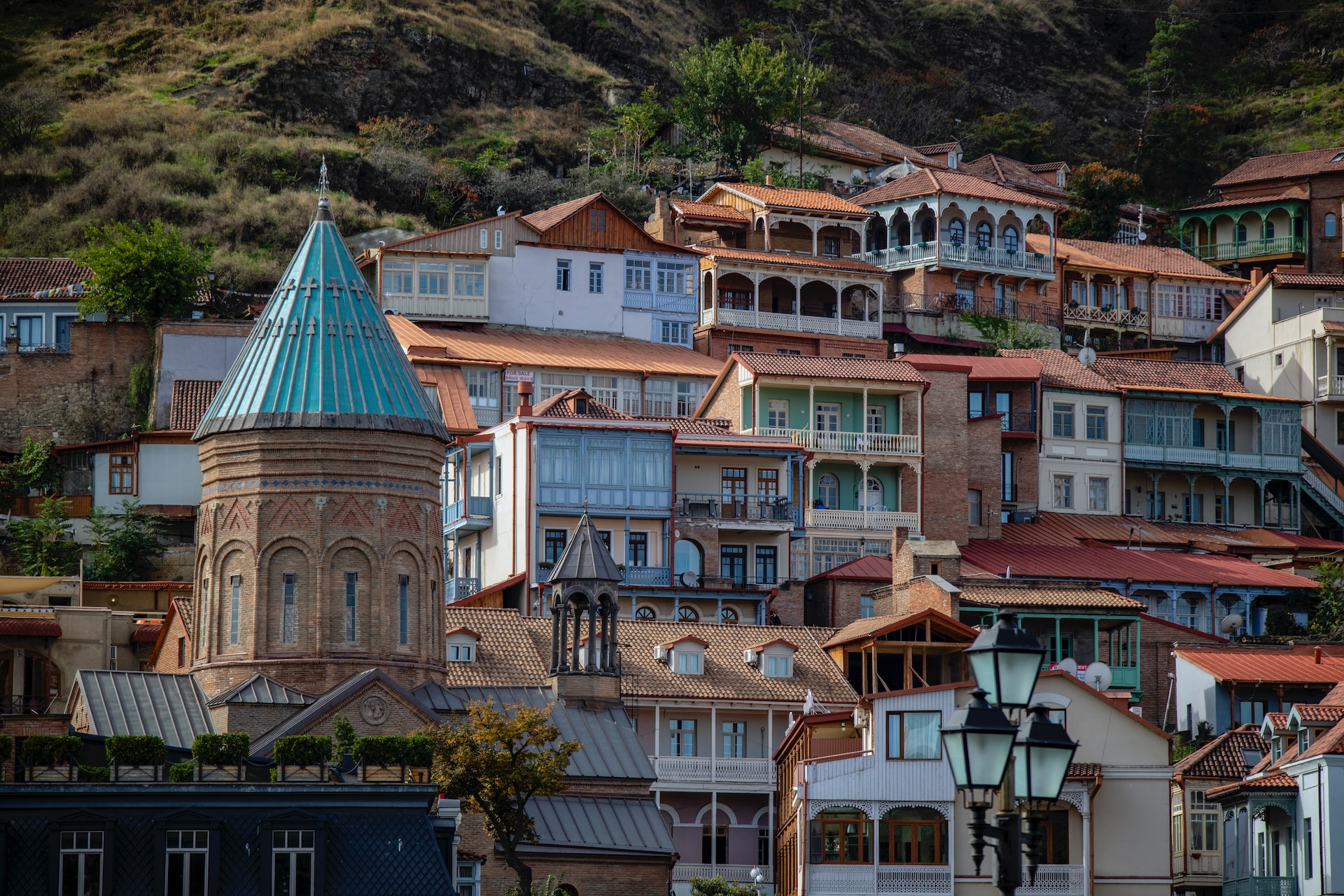
Old Tbilisi City, Tbilisi, Georgia. Image: Mostafa Meraji for Unsplash
In telling me off, I reckoned, Lolo was referring to the fact that I couldn’t simply shout greetings willy-nilly in his town, on his turf. There must be a way to do things in Georgia. And by a passing look at things, it falls somewhere beyond the pale.
Verbal communication, for instance, occurs in one of the oldest existing original languages on Earth — one of only 17, they say — and is possessed of its own 33-letter, 2,000-odd-year-old alphabet. The undulating script is also unrelated to any other except perhaps that of Middle Earth. Compulsory until the final year of secondary education, English is relatively well understood and spoken by most under-40s, with a vague grasp of it prevalent among older folk like Lolo. And at that moment, the curious gesticulations that covered the gaps in his speech were as captivating as my surroundings.
Behind me, a truck rattling over the cobbled pathway dislodged another few grains of debris from a 1,000-year-old ruin. Within direct vision, a series of wooden bannisters bent by age barely sustained a kaleidoscope of skewed balconies that cooled patches of the burning road. To my right, an ancient church loomed over the chocolatey churning of the Mtkvari River coiling through the ancient metropolis.
By nightfall, the lit-up layers of knackered, candy-coloured wooden balustrades leading up to Narikala fortress (established in the 4th century as Shuris-tsikhe or “Invidious Fort”) that dominates Tbilisi’s southwestern skyline, resembles an Arabian Nights set saturated in 1950s Hollywood Technicolor.
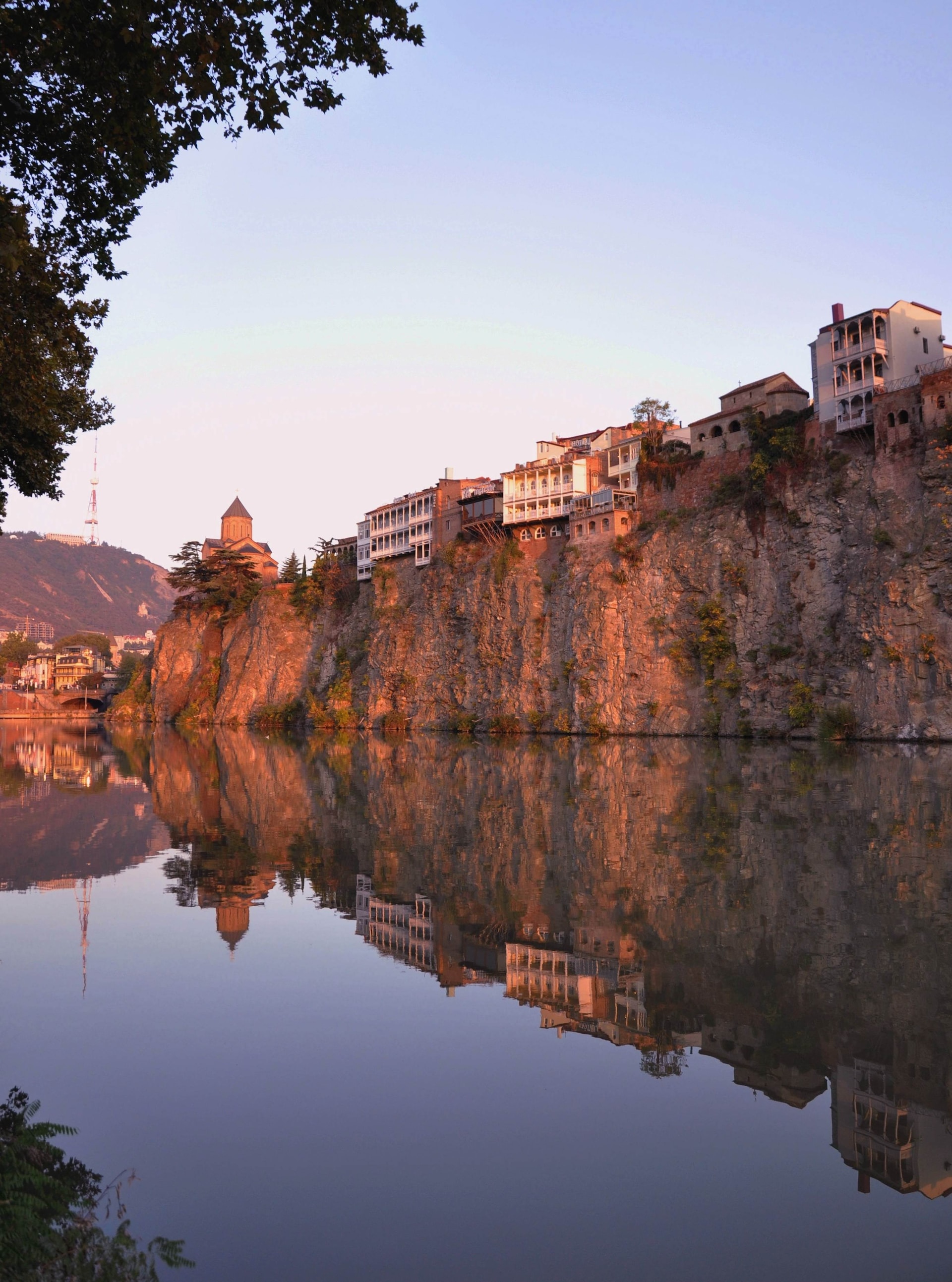
Tbilisi, Georgia. Image: Nino Gakhokia for Unsplash
The ancient Kartvelians were adherents of pagan wolf cults
The capital was moved from nearby Mtskheta to its present position in 337 AD by King Vakhtang “The Wolf” Gorgasali. His moniker is not a coincidence. The ancient Kartvelians (Georgians refer to themselves as Kartvelebi to this day) were adherents of pagan wolf cults. Mamberi — Lord of Wolves — in Georgian mythology, is still worshipped in Svaneti today. The great conquistador of the Kartvelian wolf-totem tribes of eastern Anatolia, Lydian King Myrsilus, took the name Candualus: Wolf-Slayer.
And there was certainly some slaying to be done by the Canis lupi at hand. The Kartvelian wolf tribes were in the habit of unleashing wild packs of the canines — an avant guard of wolf shock troops if you will — on the enemy. Some linguistic experts maintain that the pre-Christian origin of the name Georgia is derived from the Persian term for wolf: gurg. Persians refer to Georgia as gurjistan (Turkish gürcistan). Bring it on, Transylvania.
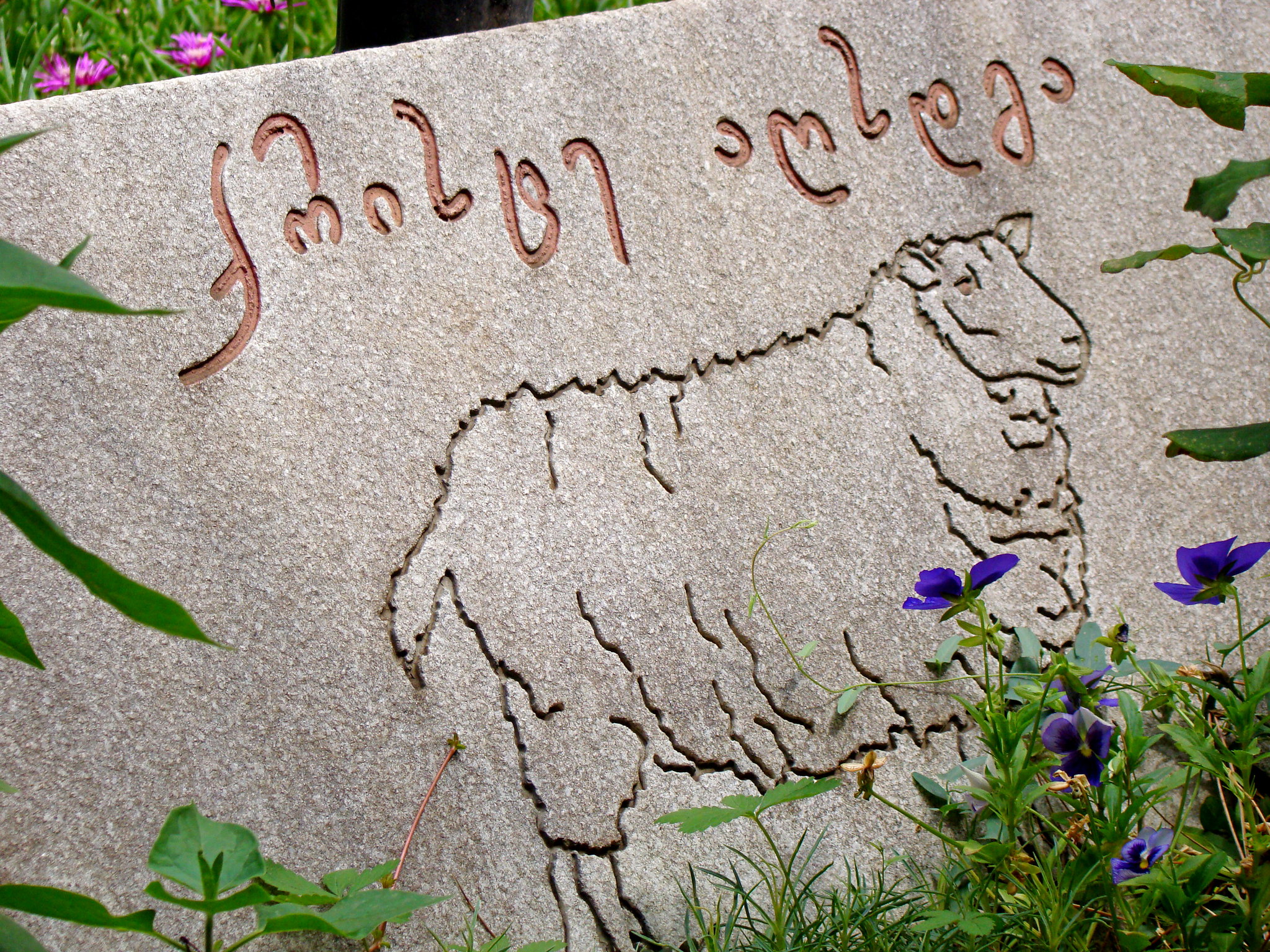
Kartvelian script. Image: Sea-Soul Bata / Flickr
Here, in his present-day domain, the current monarch of Metekhi Street, King Lolo, lifts himself from his street throne with a sigh and beckons me down to a cavernous cellar. When my vision finally calibrates with the dank vault, the bright, gleaming colours of stacked fruit and vegetables cascade into view. I’m led to a ramshackle table with several paper-cup towers and two long, unlabelled bottles of clear liquid. This, it turns out, is cha-cha, a local witblits concocted mainly from sugarcane or grapes and which constitutes much, much more than some excitable Latin jitterbug.
“Yes, you take,” Lolo demands making a drinking gesture.
One hour later, in fluent Georgian, I explained not only the general secrets of the universe to my new friends, but for the first time since I could remember, I knew exactly what to do with my life. I needed to head off to Kakheti province — Georgia’s Bordeaux, the Stellenbosch of the Caucasus. It suddenly seemed very important to be in the company of familiar beverages.
Anyone who has spent some time in Tbilisi would be well aware of the 20m-high effigy of Kartlis Deda (Mother of Georgia) watching over the city beside Narikala fortress. In one hand she holds a sword to ward off enemies, in the other, a clay bowl full of wine to offer guests. In a certain sense, it is an apt euphemism for the paradoxical nature of the Georgian experience. But it also indicates how seriously Georgians take their wine, which they have apparently been producing for more than 8,000 years before the birth of Christ (a statement backing the claim that the world’s first wines were made in Georgia).
Some miles due west of Tbilisi the road roller-coasts through a shock of leafy, lime-green tunnels to the winelands of Kakheti — home to a hefty lump of the 500 Georgian cultivars and a semi-sweet red called Kidzmarauli — the favourite of one Loseb Jughashvili, better known as Joseph Stalin, who was born some 150km to the west in Gori.
At Baghrati wine estate the erubescent liquids are still hoarded in massive subterranean earthenware amphora (kvevri) in a 7km-long labyrinth etched into a wooded mount.
“It’s like a massive open-air adult shop,” I mumbled to no one in particular while fondling what seemed to be an oversized penis immersed in a condom on the estate’s leafy terrace. Beside me, a heavy-set Georgian hauled another stack of them out of a large tin cauldron.
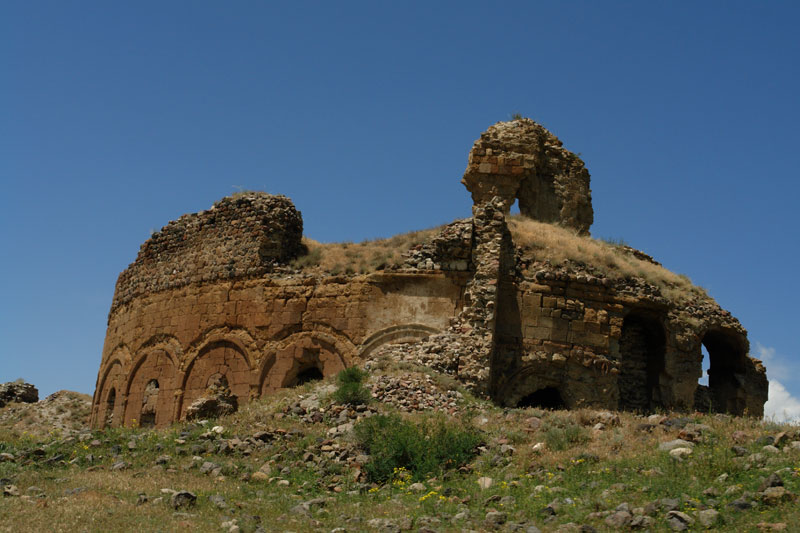
Bana Cathedral. Paata Vardanashvili / Wikimedia Commons
I first encountered churchkhela in Tbilisi where a number of locals were licking and chewing or hungrily wolfing them down at a market stall set up among antiques and other bric-a-brac spread along the bridge spanning the Mtkvari waterway. Made from grape must, walnuts and flour, it’s the nation’s national sweet snack and bunches are hung out, so to speak, all along the roads in the Georgian winelands.
A few kilometres down the road from the Baghrati estate, the medieval town of Sighnaghi lies perched precariously along the crest of a narrow peninsula that cuts into a vast valley of vineyards fading into the foothills of the perpetually snow-capped Caucasus mountains.
The blue-cold spray of endless spikes constitutes Europe’s highest mountain range — its tallest peak at 5,642m dwarfs that of the European Alps’ Mont Blanc. And wedged into the folds of the Svaneti sub-range to the north of the capital towards the Russian border, is the mountain outpost of Mestia (11 hours by road from the capital but only an hour’s flip away by helicopter).
This is home to the Svans, hardy mountain folk who have been known to exact revenge on their neighbours today for livestock allegedly appropriated more than half a century ago. When not seeking tribal justice, they indulge in ancient traditional round dances and haunting harmonious chants, senescent songs and antediluvian ditties. (They could probably sing those last two adjectives in three-part polyphony).
And some 100km as the crow flies south across the Caucasus lies one of the two regions harbouring Russian-backed separatists vying for independence from Georgia: South Ossetia. After being incorporated into the Russian fold more or less consistently since the advent of the 1800s (first by the Empire and then the Soviet Union and Federation), Georgia declared its independence from Russia in 1991. The process towards this end was still a sore point among the Russians and Georgians I spoke to in Tbilisi.
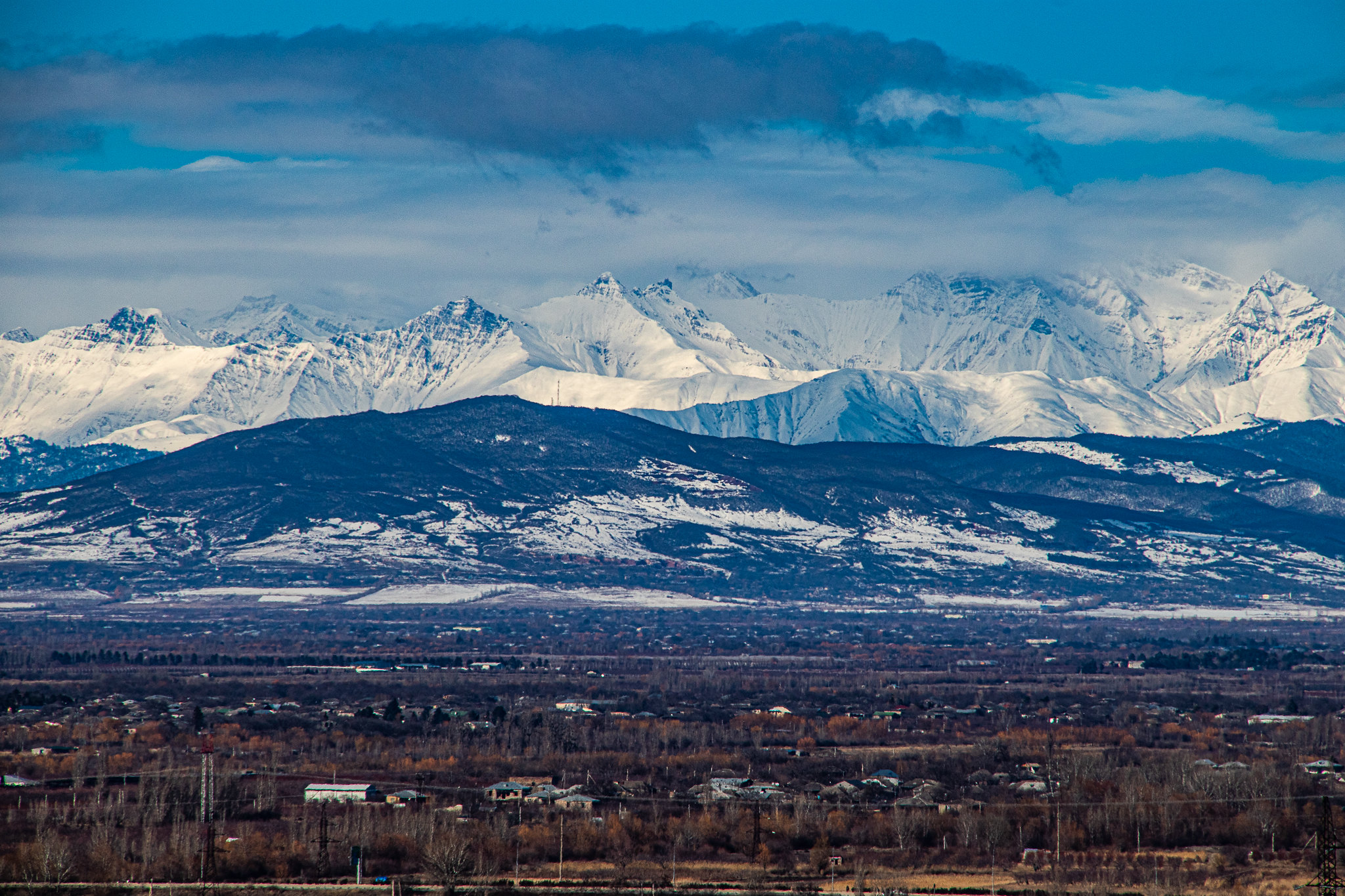
South Ossetia and the Caucasus Mountains. Image: Reinier de Rooie for Flickr
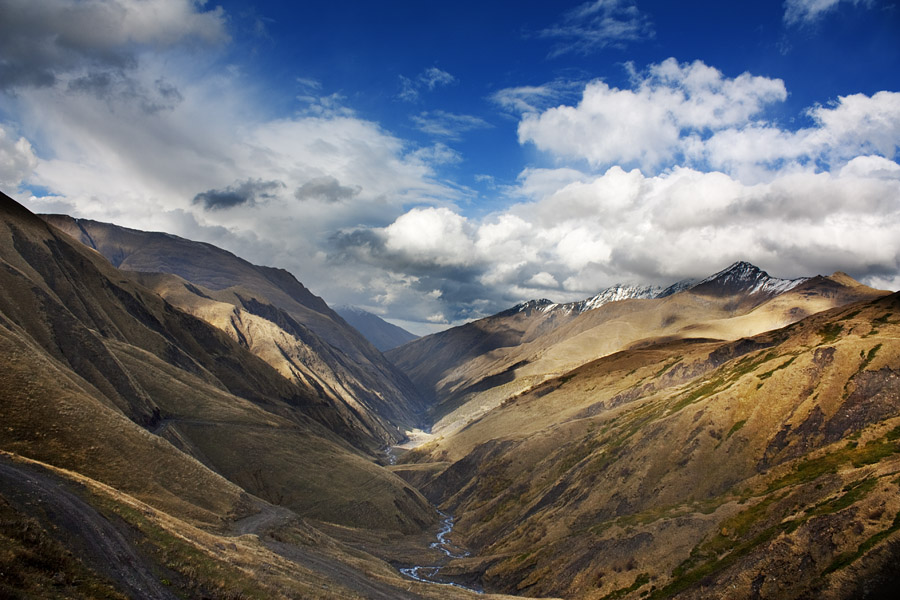
Khevsureti/Khevsuria (Georgian: ხევსურეთი, a land of valleys) is a historical-ethnographic region in eastern Georgia. They are the branch of Kartvelian (Georgian) people located along both the northern (Pirikita khevsureti) and southern (Piraketa khevsureti) slopes of the Great Caucasus Mountains. Image: Levan Gokadze / Flickr
While most Georgians by the mid-2010s preferred to see themselves as Europeans (their government was vying to become part of the EU on a mandated seven-year regimen), Russian citizens and visitors I met remained sulky and vexed, even bitter about having lost what one described to me as “part of their soul”. After a process lasting for more than two centuries, many Georgian-Russians are heavily invested in the country, physically and emotionally.
Jan Shardeni Street in downtown Tbilisi is a winding neon-lit jumble of sidewalk restaurants, bars, nightclubs and hookah cafes that erupts into postprandial rowdiness on weekends. In an overcrowded watering hole, I clink beers with a Muscovite and his girlfriend. Draped in a neat dove-grey suit jacket, Erik is an architect on a quick break in Georgia, a favourite family holiday destination ever since he can remember.
With a quick flick of his curled blond mullet, he beckons another couple over: “We all go to Batumi together!” he bellows, gathering their shoulders in a group hug before chugging down the rest of his brew. He garners smiles from his companions and apprehensive stares from nearby patrons.
‘Georgia is Russia, it is our home’
“But don’t you feel uncomfortable coming here?” I ask. “Lots of Georgians tell me you’re unwelcome.”
“Georgia is Russia,” he says smilingly. “It is our home. We have always come to Georgia. Our family is here.”
It’s an underlying tension everyone involved seemed to have accepted as inevitable.
After 1991, the rapidly crumbling Soviet Union continued supporting pro-Russian separatists in the Georgian provinces of Abkhazia and South Ossetia (North Ossetia is on Russian land, Abkhazia on the Russian-Georgian Black Sea border) and teeth-grinding skirmishes increased until a joint peacekeeping force was established between Georgia, Russia and Ossetia in 1992 (and Abkhazia in 1993) and a ceasefire declared.
The induction of Vladimir Putin as Russian president in 2000 followed by a strong pro-Western stance in Georgia as Mikheil Saakashvili, the ringleader of its “Rose Revolution”, rose to power in 2003, had the mercury rising again. One of Saakshavili’s main objectives was for Georgia to become a member of Nato.
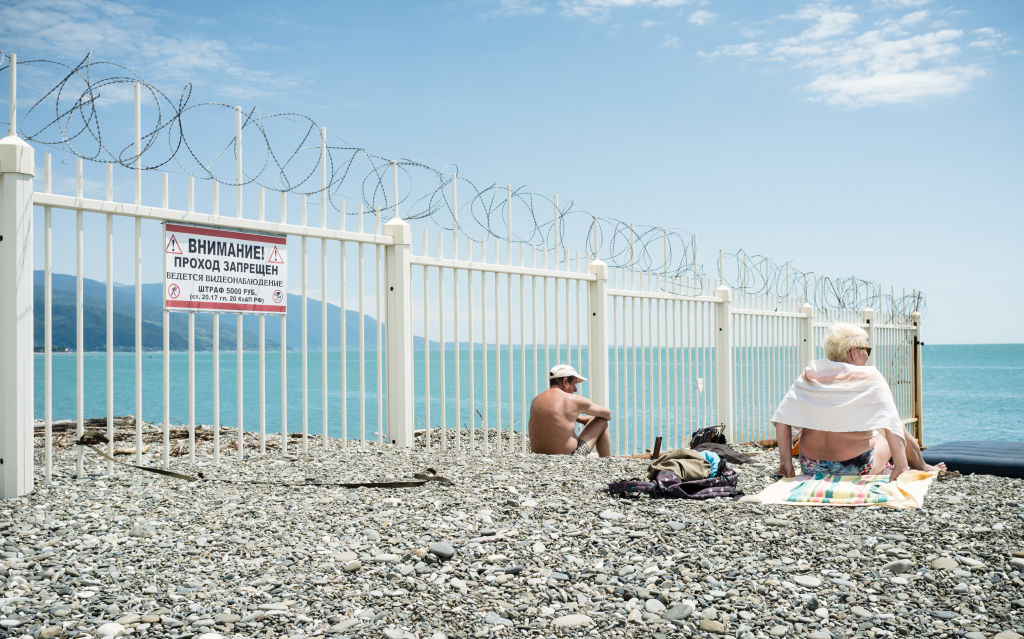
Two sunbathers are seen next to the border to Georgia on June 18, 2017 in Sochi, Russia. (Photo by Reinaldo Coddou H./Getty Images)
Although both Germany and France predicted trouble for the region if Nato membership were to be granted, US President George Bush proposed an action plan for Georgian and Ukrainian membership at the 2008 Nato summit in Bucharest. Putin said any advancement of Nato towards Russia would be considered a direct threat to Russia’s security.
The resulting Russo-Georgian war in the Transcaucasian region in 2008 is seen by most conflict fundis as the first European war of the 21st century. It was also considered to be the first international clash in which cyber warfare was employed in conjunction with military tactics. A full-scale information war was also waged during and after the conflict. And it was familiarly — in the context of the current Ukranian conflict — the then president of France, Nicolas Sarkozy, who eventually negotiated a ceasefire agreement on 12 August that year.
On 16 April 2008, Putin sanctioned official ties between the Russian authorities and the separatists in Abkhazia and South Ossetia. The United Nations Security Council convened at the end of April declared: “We call on the Russian Federation to revoke or not to implement its decision.” The Russians called it a tall order.
In early August, the unilateral 1992 ceasefire agreement was shattered by an artillery onslaught of Russian-backed Ossetian separatists on Georgian villages. The Georgian government promptly restored “constitutional order” by deploying troops and taking control of the separatist stronghold and South Ossetian capital, Tskhinvali.
Russia denied it had crossed into Georgia in support of the separatists through the Roki/Roksky Tunnel, accused Georgia of “aggression against South Ossetia” and launched a total land, sea and air offensive with the help of South Ossetian forces. Georgia held the wolf packs at bay for some days before retreating. (A similar scenario played out in Abkhazia where Russian troops relieved the Kodori Gorge of Georgian forces.)
Thumbing its nose at the ceasefire, Russian forces temporarily occupied the Georgian cities of Zugdidi, Senaki, Poti near Abkhazia and Gori near the Ossetian border while South Ossetians razed ethnic Georgian villages and indulged in a spree of ethnic cleansing. The invading Russians eventually advanced to within 40km of the Georgian capital.
Putin officially recognised the independence of Abkhazia and South Ossetia from Georgia and the Georgian government severed diplomatic relations with Russia. The war displaced more than 190,000 people. The European Court of Human Rights ruled that Russia was responsible for grave human rights abuses in the separatist regions (or “oblasts’’ as they are known.)
Despite the glaring differences between Ukraine and Georgia (such as the much smaller Russian population in the latter), there are also obvious comparisons to be made in terms of Putin’s takeover tactics in both countries.
Heading away from the political hotspots due west of the capital takes you back to proper wolf country. The Borjomi National Park is one of the largest natural spreads in Europe, comprising 7% of Georgia’s entire surface — 5,300km² of pure Eukranian wilderness.
Utilised during medieval times by the local aristocracy primarily for hunting, the nearby town by the same name that hugs the Mtkvari River and carved out the 2,600m–deep gorge, became famous for its bottled water — one of Georgia’s top export products — and curative mineral springs. It’s a hiker’s heaven for those who pack light enough to stay ahead of the prowling wolf packs, brown bears and lynxes. In winter, nearby Bakuriani is one of Georgia’s two primary ski resorts. The other, Gudauri, lies to the north of Tbilisi on the road to Mestia.
The road south from Borjomi towards the Turkish border leads to Vardzia. Vaguely reminiscent of the famous fairy chimneys of Cappadocia in central Turkey, Vardzia’s medieval cave city etched deep into the Erusheti Mountains was built in the 12th century under the reign of Queen Tamar as protection against the Mongols. The termite-like dwellings were abandoned four centuries later when the Ottomans ran roughshod over the area. The Church of Dormition, a 9.2m-tall hollow carved into the rockface and layered with religious motifs, later became the spiritual centre of the Tolkienesque metropolis.
Further afield to the west lies Batumi on the (not-so-) Black Sea coast. (It is in fact a delectably translucent turquoise akin to the Mediterranean). And much like the Riviera, it’s a sub-tropical, pebble-strewn beach playground for pleasure seekers. Not unlike Tbilisi, Batumi seemed to be bursting at the seams with newfound enthusiasm and a contagious effervescence. A burgeoning sense of abundance was evident everywhere amidst an eclectic architectural mesh of the graciously old and confidently new.
Out in the countryside, residues of the lengthy Russian occupation of Georgia were more apparent. Ancient picture-postcard villages of stone and wood were razed in the frenzy to create a stoic Soviet uniformity and substituted with garish, uninspiring concrete blocks that stand out like condos for the damned. In many, the only sign of proliferation is ultra-modern structures in highly visible settings — all-glass police stations to symbolise the new sense of political transparency.
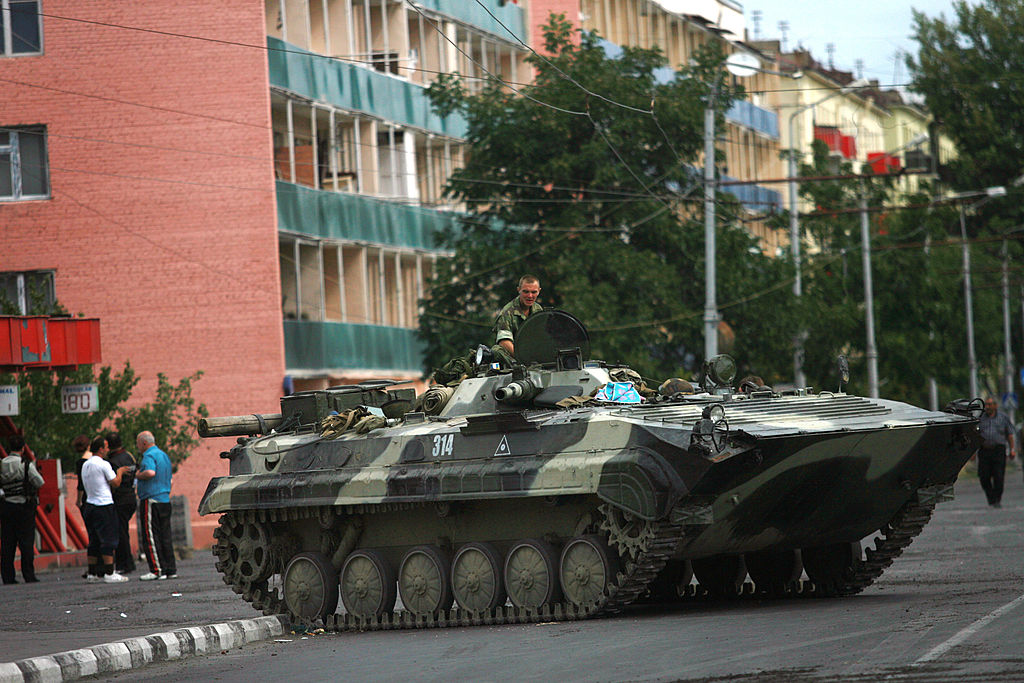
A Russian soldier sits on a tank at a checkpoint on August 14, 2008 in Gori, Georgia. (Photo by Uriel Sinai/Getty Images)
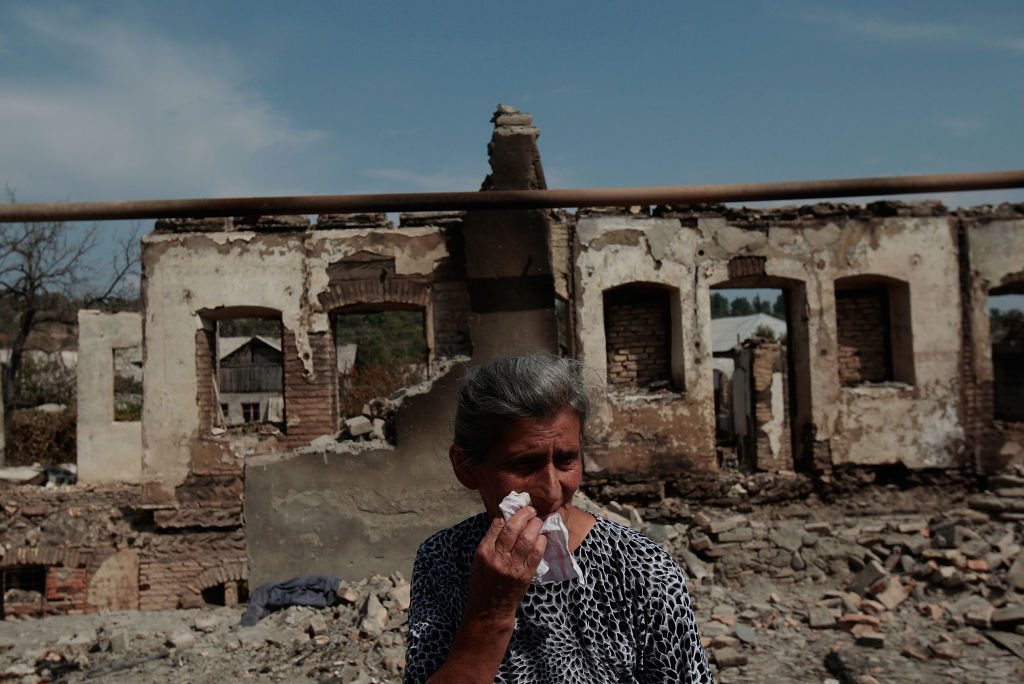
A woman walks down a destroyed main street August 21, 2008 in a suburb of Tskhinvali, the capital of the Georgian breakaway province of South Ossetia. (Photo by Chris Hondros/Getty Images)
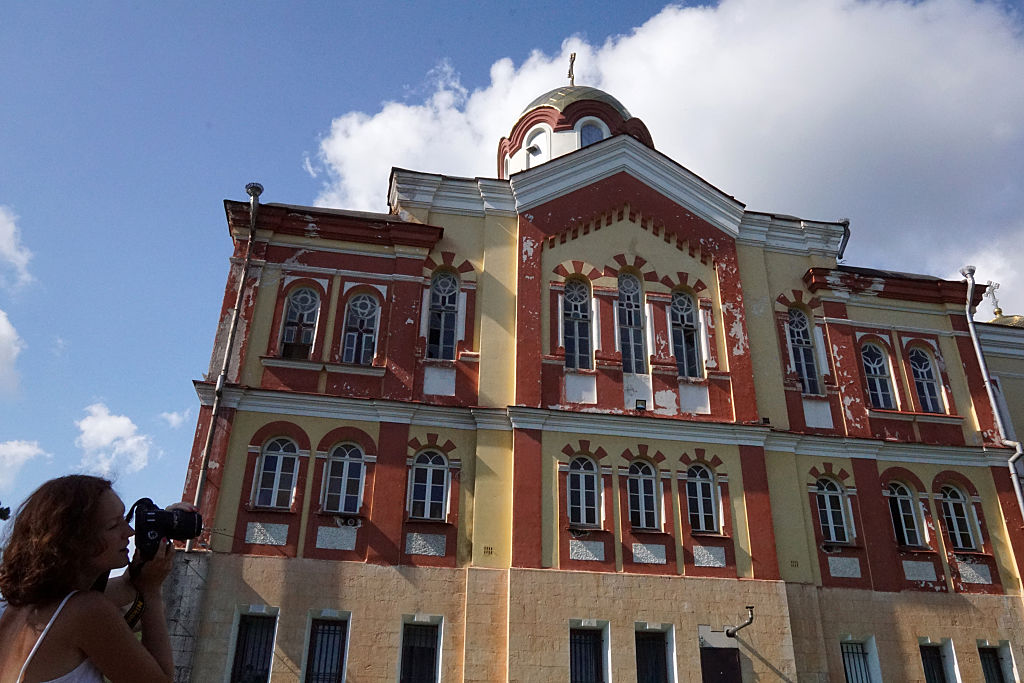
A tourist from Russia takes a picture of New Athos Monastery on July 22, 2015 in New Athos, Abkhazia. Abkhazia is a disputed territory and partially recognised state controlled by a separatist government on the eastern coast of the Black Sea and the south-western flank of the Caucasus. (Photo by Sasha Mordovets/Getty Images)
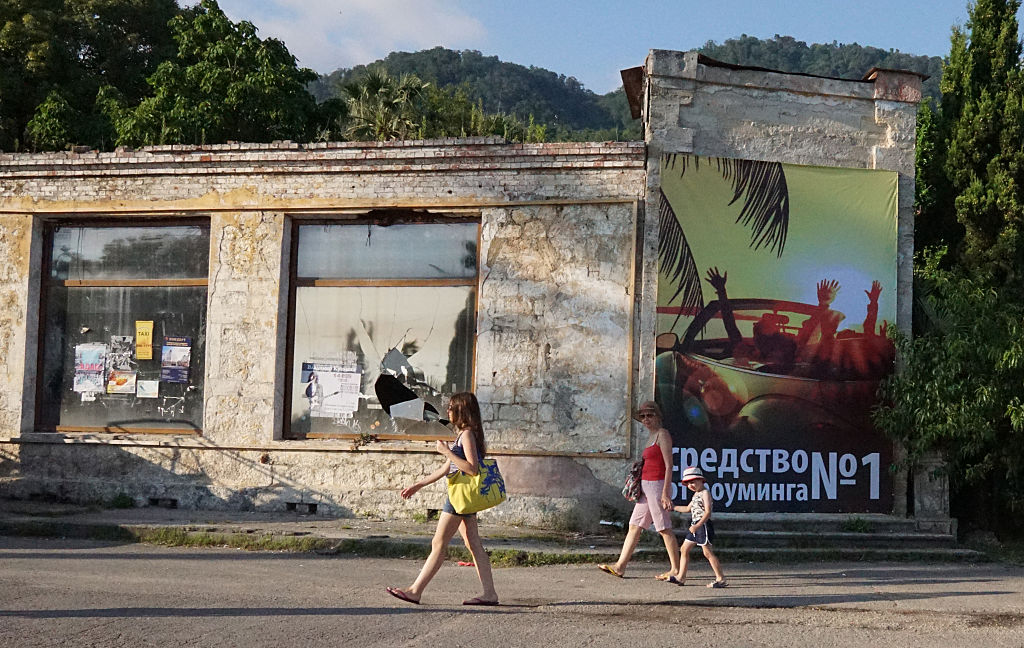
Tourists from Russia walk by the street on July 22, 2015 in New Athos, Abkhazia. Abkhazia is a disputed territory and partially recognised state controlled by a separatist government on the eastern coast of the Black Sea and the south-western flank of the Caucasus. (Photo by Sasha Mordovets/Getty Images)
A series of post-Soviet governments claimed to have all but cleared out corruption, and miraculously, crime, by firing practically the entire former police force and creating a relatively benign but highly visible peacekeeping machine in a spanking new uniform. Funky young government officials with an open-door attitude had relaxed the tax laws and elevated the happening would-be democracy right up to number eight on the global easiest-to-do-business-with rankings. Snug in its new postmodern coat, Georgia had thrown its portals wide open to tourists and investors alike.
The ebullience didn’t last. Soon after he lost the 2013 election, Mikheil Saakashvili went into exile in Ukraine where he first became governor of the Odesa region and later head of the Ukrainian Presidential Committee of Reforms in Kyiv. Then he was expelled from Ukraine by President Petro Poroshenko in 2018 and left for the US before being welcomed back by Ukraine’s current leader, Volodymyr Zelensky.
Saakashvili was found guilty in absentia by the Georgian judiciary of “abuse of office and misappropriation of budgetary funds” and arrested on his return to Georgia last year. He survived a 50-day hunger strike in protest against his “unfair trial” and the treatment of prisoners. His pro-West, pro-Nato policies still echo around his Rustavi prison cell.
Many feel the Ukrainian conflict started 15 years ago with the invasion of Georgia
In the interim, the general notion that the Ukrainian conflict started more than 15 years ago seems to be gaining ground along with anti-Russian sentiments in Georgia. The current president, Salomé Zurabishvili, last week sent a message of support to the more than 30,000 citizens who marched to Parliament to protest against a Russian-type draft law that would have classed media groups and other non-government organisations as “foreign agents” if they garnered more than 20% of their funding from abroad.
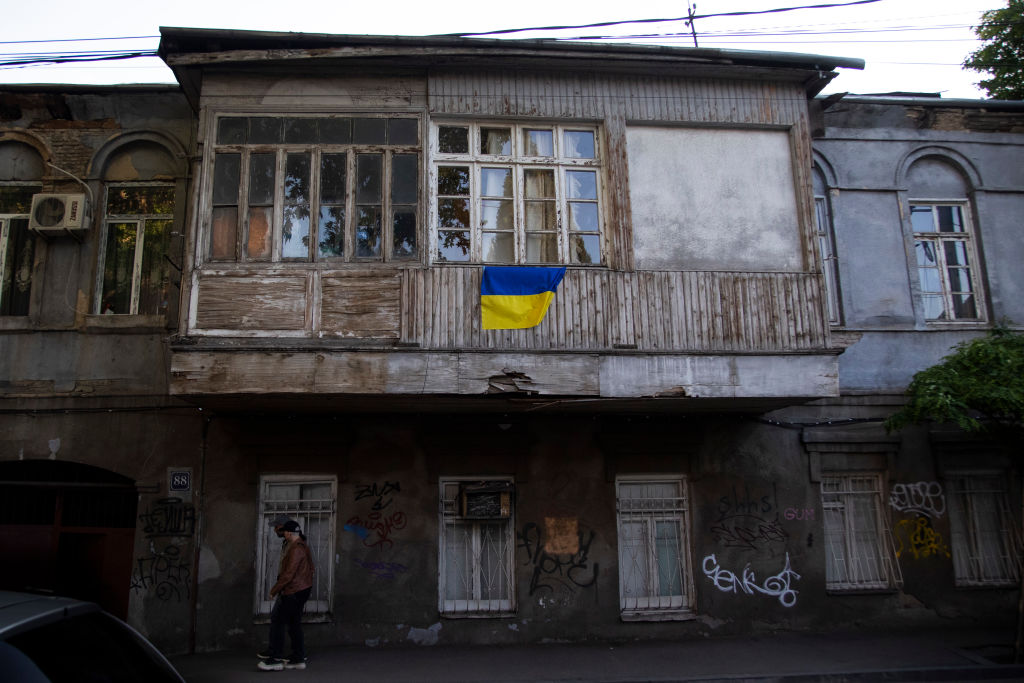
Ukrainian flags are hanged in various locations around the city as a support for Ukraine on May 21, 2022 in Tbilisi, Georgia. Both Ukrainian refugees and Russian emigres have fled to Georgia, a former Soviet republic with its own history of conflict with Russia, following that country’s Feb. 24 invasion of Ukraine. (Photo by Daro Sulakauri/Getty Images)
And although the plug was rapidly pulled on the legislation proposed by the ruling Georgian Dream Party last Friday, the protest in the capital continued as a general anti-Russian statement. Congratulating them on their “first victory”, the president said: “There is distrust toward the government as we pursue our European path.”
Georgia’s aim to gain acceptance to the EU is still spluttering along (an Association Agreement was put into force in 2016), though its human rights edifice was cracked down to its foundation in 2021 when 36-year-old cameraman Alexander Lashkarava was beaten to death by right-wing assailants protesting against a planned LGBTQ Pride march in Tbilisi calling for the resignation of Irakli Garibashvili, the prime minister and leader of the Georgian Dream Party. Reporters Without Borders accused the government of “culpable passivity’’ as thousands took to the streets to protest against Lashkarava’s murder.
Despite the roller coaster ride towards democracy, the general mood seems as positive as it was when I made my rounds there some seven years ago when Georgia was still brimming with hope for the future as it vigorously attempted to shrug off centuries of imperialist dominance. Arms outstretched to welcome foreign input and a proposed new democratic future, Georgians everywhere seemed to be exerting a fresh zest for change.
And a more accommodating and buoyant bunch of citizens would have been hard to find. Lolo, as it turns out, was not opposed to my particular greeting style. He was disgruntled about me imbibing beer communally without making a toast. The Georgian tamada or toastmaster is a well-known feature along the old Silk Road and any excuse to down another one after a fresh round of compliments is as common as the antiquated harmonies belted out at any given Georgian table. Or sidewalk, as it were. DM/ML


















 Become an Insider
Become an Insider
Wonderful story Doop. I think the boffs say wine was first made in either Georgia or Persia. But I here I have to play my history-nazi hand on the Euro-Levantian-centric view of languages: all the oldest are African, probably what we now call San. 🙂 🙂